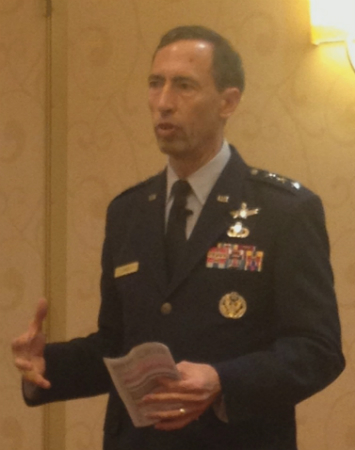 The Air Force won’t be making another pitch to be the executive agent for remotely piloted aircraft anytime soon, said Lt. Gen. Larry James, head of the service’s intelligence, surveillance, and reconnaissance enterprise, on Thursday. Speaking at an AFA-Air Force Breakfast Program event in Arlington, Va., James said, “I think it’s working OK the way it is,” referring to the arrangement whereby the undersecretary of defense for intelligence coordinates the various service efforts in RPAs. Together with an ISR task force, that office is scrutinizing ISR systems—”especially in the airborne ISR arena, to make sure we’ve got that right . . . in terms of who’s doing what,” said James. The USD(I) is trying to “look broadly across” the services “as we come out of Afghanistan” to determine “the right mix of airborne capabilities” among the various branches, he added. The Air Force last pushed to become the executive agent for higher flying RPAs—meaning lead service and coordinator—in 2007, when service officials argued that they could get more ISR value out of the all-service RPA fleet than the services could acting separately, and sometimes redundantly. The then-Pentagon leadership denied the request and then-Deputy Defense Secretary Gordon England put the USD(I) in charge of RPA coordination. The arrangement doesn’t seem to be causing James any headaches. “I don’t think it demands the Air Force become the executive agent,” he said during the April 18 event.
The Air Force won’t be making another pitch to be the executive agent for remotely piloted aircraft anytime soon, said Lt. Gen. Larry James, head of the service’s intelligence, surveillance, and reconnaissance enterprise, on Thursday. Speaking at an AFA-Air Force Breakfast Program event in Arlington, Va., James said, “I think it’s working OK the way it is,” referring to the arrangement whereby the undersecretary of defense for intelligence coordinates the various service efforts in RPAs. Together with an ISR task force, that office is scrutinizing ISR systems—”especially in the airborne ISR arena, to make sure we’ve got that right . . . in terms of who’s doing what,” said James. The USD(I) is trying to “look broadly across” the services “as we come out of Afghanistan” to determine “the right mix of airborne capabilities” among the various branches, he added. The Air Force last pushed to become the executive agent for higher flying RPAs—meaning lead service and coordinator—in 2007, when service officials argued that they could get more ISR value out of the all-service RPA fleet than the services could acting separately, and sometimes redundantly. The then-Pentagon leadership denied the request and then-Deputy Defense Secretary Gordon England put the USD(I) in charge of RPA coordination. The arrangement doesn’t seem to be causing James any headaches. “I don’t think it demands the Air Force become the executive agent,” he said during the April 18 event.
Air Force Gen. Alexus G. Grynkewich assumed command of U.S. European Command on July 1, taking over the key assignment as the U.S. and its allies contend with a resurgent Russia and a grinding war in Ukraine.
